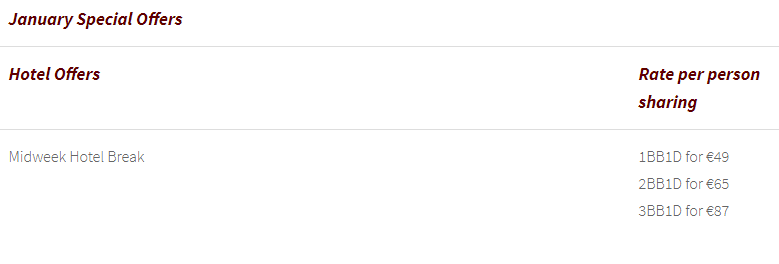With Christmas being less than 6 weeks away, planning for the festive season is in full swing and most Christmas decorations are being put up in hotels already.
As well as getting the hotel ready for Christmas, it is just as important to get the content on your website and rates in the booking engine ready for the festive season.
When optimising content on your site, updating your Marketing landing pages or editing rate plan descriptions – here is what you have to keep in mind:
At the initial stages ask yourself the following: do you use plain language that everyone can understand, or do you use technical hotel jargon?
Don’t let industry jargon get between you and your guests! In this blog we give you 4 points we recommend you check when writing your rate plans…
Take a look at this example of bad rate plan titles, even if they’re space-saving, these abbreviations are to be avoided at all costs.
2BB, 1BB1D, FOC… these are expressions regularly used by hoteliers and employees who have been working in the hospitality industry for years. But would everyone understand what this jargon means when looking to book a holiday?
After working in the tourism sector for numerous years, it is easy to forget that these are not common terms used by leisure guests and tourists.
A common mistake made by hoteliers is assuming everyone will understand the jargon that is being used for rate plans or rate plan descriptions. It is important to keep in mind you’re not selling your rooms to people in your industry, but to non-hoteliers.
With Black Friday and Christmas just around the corner, we want to make sure your content is easy to understand and doesn’t hinder your audience from booking.
Why Clarity trumps persuasion!
But how do you make your content user-friendly and easily understandable for everyone? The success of your content largely depends on your audience’s familiarity with the terms you’re using to describe your offers.
Decision-making processes heavily rely on familiarity, particularly for conversion optimisation. With the new insights gained, we will apply them to industry examples below and put them into practice.
Best Practices For Writing Rate Plans:
This should be a no-brainer – one of the main goals of a rate plan and its description should be detailed information about which services your guests can expect to receive during their stay. Ideally, this is reflected in the rate name, but beware, while short and snappy is usually best practice here, make sure potential bookers are still able to understand your offers.
Here is a nice example of Christmas rate plan, which includes a clear and appealing title, as well as an informative description. Note how there are no abbreviations or industry-specific jargon, and the rate is displayed simply in the ‘total price’ format.
3BB1D: a short and snappy description commonly used by hotels. While quirky and outside the box thinking is encouraged, there is no need to reinvent the wheel either. Highlight that 3BB1D entitles your guests to a 3-Night Bed & Breakfast Stay and dinner on 1 evening.
Book Direct: – A buzzword getting more and more popular, but very unfamiliar to the average person looking to book a hotel. Try saying the same thing by simply changing it to “best rates on our website” or “book directly on brand.com”.
Your content and rate plans must always answer the following 4 questions:
- Number of room nights
- Services included
- Upsells included (Free Wi-Fi, Parking, Leisure Facilities)
- Clearly state the price*
*Best practice for price is sticking to one strategy throughout all rates offered (stay away from combining different pricing strategies such as total price, per night, per person)
To conclude:
Only use highly specialised language and offers for a specialty audience! Using jargon to create a higher value for your products is desirable, but you still want your audience to understand your products. Keep in mind who you are talking to, your Christmas content is for your hotel guests, not other hoteliers!





